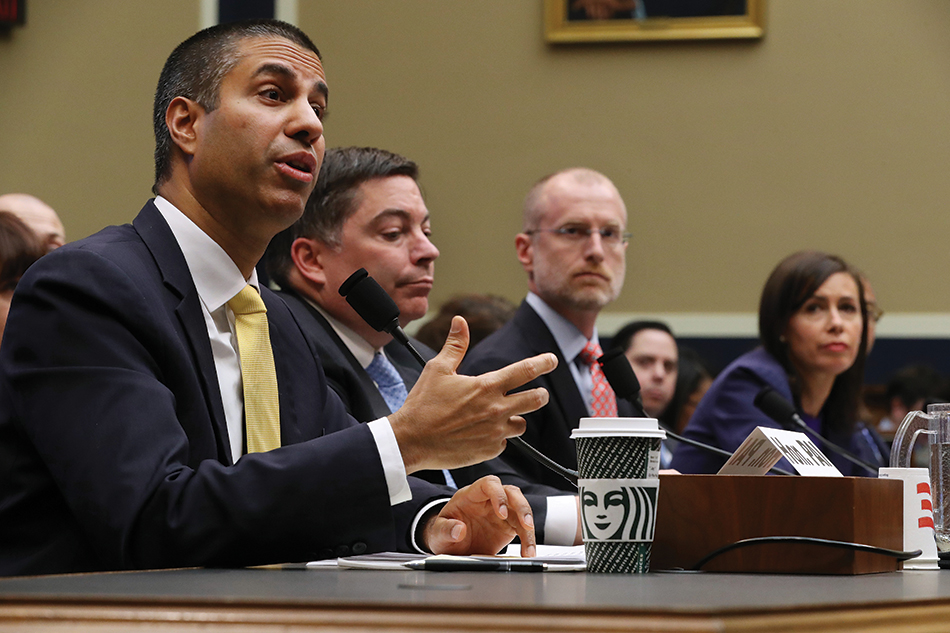C-Band Auction Would Pay $9.7B Starting in 2021
The smarter way to stay on top of the multichannel video marketplace. Sign up below.
You are now subscribed
Your newsletter sign-up was successful
Starting a new “accelerated relocation payments” process, Federal Communications Commission chairman Ajit Pai has proposed a C-band spectrum auction that would trigger up to $9.7 billion in payments to incumbent satellite operators that use the bandwidth, with initial payouts beginning by late next year. That sum is in the middle range of predicted amounts for reallocating and repacking the bandwidth to accommodate both new 5G wireless services and traditional satellite video delivery.
The auction will begin Dec. 8. In a speech, Pai predicted the plan would be greeted with challenges about whether the projected auction target revenue is too high or too low.

He was right about the challenges, although many of the groups involved in the looming proceeding are withholding official responses until the FCC adopts the proposal on Feb. 28.
Details About the Draft Rules
Pai's draft rules would make the lower 280 megahertz of the C-band (3.7 to 3.98 GHz) available for flexible use, including for 5G. The 20 MHz above that (3.98 to 4 GHz) would serve as a guard band. Existing satellite operations (delivering video programming to cable headends and broadcasters) would be repacked into the upper 200 MHz (4.0 to 4.2 GHz) of the band, with relocation costs covered by the auction and paid directly by winning bidders to the satellite carriers.
Satellite operators could receive accelerated relocation payments if they can clear the lower portion of the C-band on a speeded-up timeline, thus advancing the national priority of making spectrum available for 5G deployment more quickly.
In a Feb. 6 speech at the Information Technology and Innovation Foundation, Pai said the payments "would create powerful incentives for incumbent operators to expedite the transition." His accelerated time frame calls for clearing the lower 100 MHz of the C-band in 46 of the nation’s top 50 "Partial Economic Areas" ( about 55% to 60% of U.S. households) by September 2021 and reclaiming the remaining spectrum by September 2023.
The smarter way to stay on top of the multichannel video marketplace. Sign up below.
“Satellite companies don’t need the entire C-band to provide the same services they are providing today,” Pai said. “This creates an opportunity for a consumer-friendly transition."
He said the agency considered a private auction to sell off the spectrum, but concluded that “bidders would be less likely to participate in an untested private auction, one that was described in our record as 'fiendishly complex.’”
Pai said the goal is for funds to be transferred "quickly in order to free up spectrum for 5G sooner rather than later."
"This transition will be much faster if we can create powerful incentives for incumbent operators to expedite the transition,” he said. "And to make sure they follow through — they would only be paid the full amount if in fact they did so. That is why I favor targeted accelerated relocation payments.
“I don’t favor accelerated relocation payments because they are in the private interest of satellite companies,” Pai added. “I favor accelerated relocation payments because they are in the public interest.”
Predictable Responses About Fees
Sen. John Kennedy (R-La.), who has opposed a big payout to satellite providers, characterized Pai's plan as “much too high,” referring to the “foreign satellite companies” that operate C-band services.
The plan also was quickly challeng e d by the Democratic chairs of the House Energy and Commerce Committee and its Communications and Technology Subcommittee. Committee chairman Frank Pallone (D-N.J.) and subcommittee chairman Mike Doyle (D-Pa.), in a joint statement, insisted that the plan "only reiterates the need for legislation."
"The questionable legal basis for the satellite incentives will likely result in litigation, which will delay the deployment of 5G," they said. "Moreover, without Congressional action, this auction will not fund critical public safety infrastructure or bridge the digital divide."
They said they will "continue to work with our Republican colleagues to achieve that end.”
The C-Band Alliance, which includes satellite operators Intelsat, SES and Telesat, called Pai's comments "significant" but otherwise noncommit tally acknowledged that the "draft order reflects the tireless efforts of many over the past several years to ensure that this critical spectrum comes to market U.S."
Pai's Republican FCC colleagues, Michael O’Rielly and Brendan Carr, support his plan.
But Democratic commissioner Jessica Rosenworcel fretted that Pai's plan ignores congressional intent and is “putting the future of 5G service on shaky legal ground.” A spokesman for commissioner Geoffrey Starks said his office has just received the proposal and is "reviewing it closely."
On the cable front, ACA Connects said it would withhold comment until after it reviews the FCC's official proposed order. NCTA-The Internet & Television Association also had "no comment.”
Contributor Gary Arlen is known for his insights into the convergence of media, telecom, content and technology. Gary was founder/editor/publisher of Interactivity Report, TeleServices Report and other influential newsletters; he was the longtime “curmudgeon” columnist for Multichannel News as well as a regular contributor to AdMap, Washington Technology and Telecommunications Reports. He writes regularly about trends and media/marketing for the Consumer Technology Association's i3 magazine plus several blogs. Gary has taught media-focused courses on the adjunct faculties at George Mason University and American University and has guest-lectured at MIT, Harvard, UCLA, University of Southern California and Northwestern University and at countless media, marketing and technology industry events. As President of Arlen Communications LLC, he has provided analyses about the development of applications and services for entertainment, marketing and e-commerce.

